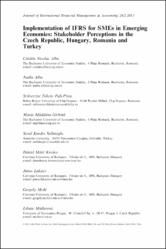Implementation of IFRS for SMEs in Emerging Economies: Stakeholder Perceptions in the Czech Republic, Hungary, Romania and Turkey

Göster/
Erişim
info:eu-repo/semantics/closedAccessTarih
2013Yazar
Albu, Catalin NicolaeAlbu, Nadia
Pali-Pista, Szilveszter Fekete
Girbina, Maria Madalina
Selimoğlu, Kardeş Seval
Kovacs, Daniel Mate
Strouhal, Jiri
Üst veri
Tüm öğe kaydını gösterÖzet
This research investigates the perceptions of stakeholders involved in financial reporting in four emerging economies (the Czech Republic, Hungary, Romania, and Turkey) regarding the possible implementation of IFRS for SMEs, in terms of costs, benefits, and strategy of adoption. In-depth, semi-structured interviews were conducted with representatives of main stakeholders (preparers, auditors, regulators, professional bodies, and users). We find more support for IFRS for SMEs implementation in these four countries than suggested by the results of the European Commission's consultation for the European Union. Interviews reveal differences between stakeholder groups and between countries regarding the preferred implementation approach (mandatory adoption, voluntary adoption or convergence of national regulations with IFRS for SMEs). Interviews indicate the most support for the convergence approach. However, users oppose convergence and prefer the adoption of IFRS for SMEs. The convergence approach moves regulators' attention from users' needs to preparers' preferences and preparedness. This finding is relevant in the decision-making process of national regulators, who should balance the needs of various stakeholders, but also the country's political and economic objectives.

















